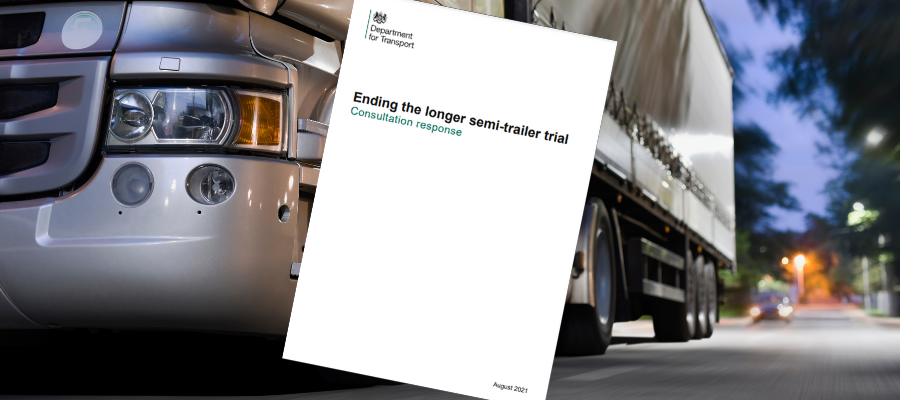🕒 Article read time: 2 minutes
Longer semi-trailers are a step closer to being introduced on Britain’s roads

Logistics UK is delighted that its suggestions have been adopted in the revised proposals for the longer semi-trailer (LST) trial, following the Department for Transport’s (DfT) publication of its Ending the longer semi-trailer trial consultation response last week (24 August 2021).
“We are pleased to see that the ongoing Annual Report, which demonstrates the safe use of longer semi-trailers and their environmental benefits, shows that our suggestions have been acknowledged by the Department for Transport,” said Phil Lloyd, Head of Engineering Policy, Logistics UK. “DfT is now looking to bring the trial to an end and put these trailers into general circulation, subject to legislation and certain safety mitigation measures.”
MORE SPACE, SAME WEIGHT
Longer semi-trailers (LSTs) are up to two metres longer than standard length trailers, with a maximum total vehicle length, including tractor unit, of 18.55 metres. Although they cannot exceed 44 tonnes in weight, the extra space allows 30 standard pallets to be transported in an LST compared to 26 in a standard trailer. This leads to fewer overall journeys and increased environmental and operational efficiencies.
“Trailers tend to bulk out before they reach their weight limits,” Lloyd explained, “Even when you have got weight capacity you may run out of space. Parcels and palletised goods tend to be light products but they’re bulky. These longer trailers allow you to capitalise on the extra space within the existing weight limits.”
LONGER THAN EXPECTED TRIAL
First introduced in 2012, the LST trial has been unusually long in duration. Its principal objective was to facilitate more efficient and environmentally beneficial freight transport, by permitting the transport of an equal amount of goods in fewer journeys.
“The trial was intended to run for a set period of time,” Lloyd explained, “and then it was extended as DfT wanted to extend the numbers of operators participating within the trial. Logistics UK has been campaigning over a number of years to get LSTs into general circulation.”
DfT’s conclusions on the LST trial consultation find the vehicles to be safer, more economical and better for the environment than standard HGVs. Up to the end of 2019 the trial result indicated that LSTs reduced journey numbers by one in twelve, resulting in a saving of more than 54 million vehicle kilometres, 48,000 tonnes of CO2 and 241 tonnes of NOx.
LOGISTICS UK’S SUGGESTIONS ADOPTED
Logistics UK was pleased to note that the report acknowledged and quoted a number of the comments it made and adopted these suggestions in its revised proposals.
“The report includes a lot of comments from Logistics UK,” Lloyd said, “many of which take into account some of the things we said on removing the duplication of incident reporting and administrative procedures with the Traffic Commissioners.”
Logistics UK argued that operators should not have to report incidents separately to the Traffic Commissioner, DfT and DVSA as there already exists a compulsion to report them under the Health and Safety at Work Act.
MOST RESPONDENTS BACK LONGER SEMI-TRAILERS
More than half of respondents to the Ending the longer semi-trailer trial consultation felt that LSTs should be in general circulation and could see the positive effects for the industry and environment. The 43% of respondents who felt LSTs should be removed were private individuals, campaigns and charities concerned with road user safety.
“Private individuals may not necessarily understand the limitations to longer semi-trailers,” Lloyd said, “I’ve had discussions with other road safety campaigners who claimed that LSTs damage infrastructure. I argued that as they have to meet the turning circle requirements, they are no different from an ordinary vehicle in that respect, as they follow the same trajectory when they’re going round bends. A long tractor unit with a standard trailer will have a turning circle that is exactly the same as a standard tractor unit with a longer semi-trailer.”
LOOKING AHEAD
Lloyd is delighted that LSTs now look set to be in general circulation by the first quarter of 2022.
“Logistics UK has been campaigning on this issue for years,” he said, “This precedes me joining the business group three years ago.”
There will also be a set of operators’ guidance documents produced, that will help operators to run these trailers safely.
The ability to operate LSTs outside of the trial is widely expected to begin between January and April 2022. Those who participated in the trial can still operate under trial conditions for a further 12 months.
“Our members were asking us to bring this trial to an end,” Lloyd said, “Owing to the length of the trial, some of the trailers were coming to the end of their life. Now they will have the confidence and certainty to invest in a new fleet of LSTs.”
*www.logistics.org.uk/campaigns/environment
Published On: 02/09/2021 16:00:27

Comments Section
If you are a Logistics UK member login to add comments.